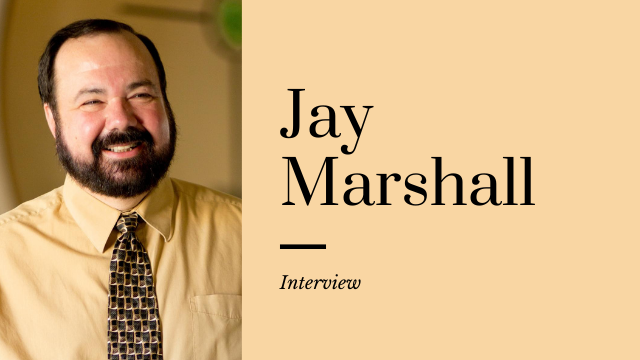
This interview with educator, Jay Marshall follows our earlier conversations with educators Terry Nance, Sa’ed Atshan, Maurice Eldridge, and Sarah Willie-LeBreton.
A recorded Friends minister of North Carolina Yearly Meeting, Jay Marshall graduated from Guilford College in 1985. He earned his M.Div. in 1988 and a Ph.D. in 1992 from Duke University. He served as a Dean of the Earlham School of Religion, retiring in 2018 after 20 years of tenure. He continues to serve the Earlham religious community as Dean Emeritus.
Jay Marshall will be facilitating a May 25th workshop for the Runway to Annual Sessions that discusses content presented in his recent book. Titled, When Spirit Calls: Engaging the Challenge of Ministry, the book is resource for Friends seeking guidance as they explore the ways Spirit invites us into deeper reflections on faithfulness, witness, and service.
Unpacking and interpreting an individual’s leading or call at the outset is merely the first step in what becomes an iterative spiral for a life that intends to remain true and aligned with the impulses of the Spirit.
Here is our conversation with Jay Marshall on faith, his book, and work at Earlham College:
How does your Quaker faith connect with your work as an administrator and educator?
I think non-profit settings present ideal opportunities for a person to blend their faith with their work. Quakers have a history of carrying their Light into their work and their world. Some of our most significant contributions to society have come in response to addressing broader social issues.
Among those, we might name set prices in place of bargaining or prison reform. Education is another one of those.
Guided by a foundation of Quaker values or distinctives and an attentiveness to the Spirit, I found an administrator and educator role provided ample opportunities to shape an institution’s mission and practice as well as contribute to the ongoing formation of employees and students alike in a setting where the explicit focus was to discern the Spirit’s call.
What led you to write When Spirit Calls: Engaging the Challenge of Ministry?
I consider the writing of the book to be a response to a leading.
When I retired, several people expressed a hope that I would write. Shortly after, I received an invitation to submit a book proposal to (Friends General Conference’s) QuakerBooks. That prompted a discernment process – if I were to write a book, what would be its focus? This book was the answer to that question. My hope is to provide a resource for Friends and stir conversations within individuals and their meetings or other significant supportive communities.
How do you plan to reach out to Quaker audiences with this book? Are you interested in presenting on the topic at meetings and quarters?
It can be a challenge to reach Quaker audiences because groups are very protective of their communication channels.
Wherever I find a cooperative spirit or other opportunities, I share an offer to meet via Zoom one session with groups of 6 or more who choose to read the book together. I’ve notified a few yearly meetings and individuals of this opportunity. FGC recently included a book discussion as part of its Spiritual Deepening opportunities.
Currently, I am experimenting with Facebook ads as a means of connecting with individuals who might be interested in a 4-week workshop. It will be interesting to see how that goes.
Friends talk about bringing Quaker process into their lives; can you speak to the importance of discernment in professional and personal situations?
Friends place so much emphasis on hearing the Spirit or minding the Light. I think discernment is a core component of that emphasis. Life is full of opportunities, challenges, and decisions that benefit from listening for the still small voice and discerning the best path forward.
What led you to the Quaker faith; what keeps you connected to being a Friend?
My father’s side of the family has a long history of Quaker connections. As a young boy, I attended meeting with them among FUM-affiliated Friends in North Carolina. When the time came to decide for myself, it was the role of silence as a medium for worship and Friend’s view of Spirit that persuaded me to remain among them. That is probably still the main attraction for me.
Tell us more about your work at Earlham College.
For twenty years, I served as Dean of the Earlham School of Religion. That was also a vice president position at Earlham College.
My work had internal and external responsibilities. Internally, I worked with the faculty to develop and coordinate the educational program. During this time we launched new innovations like a distance learning program, a digital collection of Quaker texts, cross-cultural educational opportunities, and certificate programs in Quaker studies, spirituality, and entrepreneurial ministry.
The latter was particularly dear to my heart. Externally, I developed relationships with Friends, including but not limited to fundraising. I particularly enjoyed offering a Traveling Ministries program where several of us offered workshops, lectures, and other learning opportunities out among the various bodies of Friends. I found those two decades to be extremely rewarding.
Reach out to Jay Marshall
If you would like to connect to Jay please email obrangan@pym.org
Image Credits: Earlham College